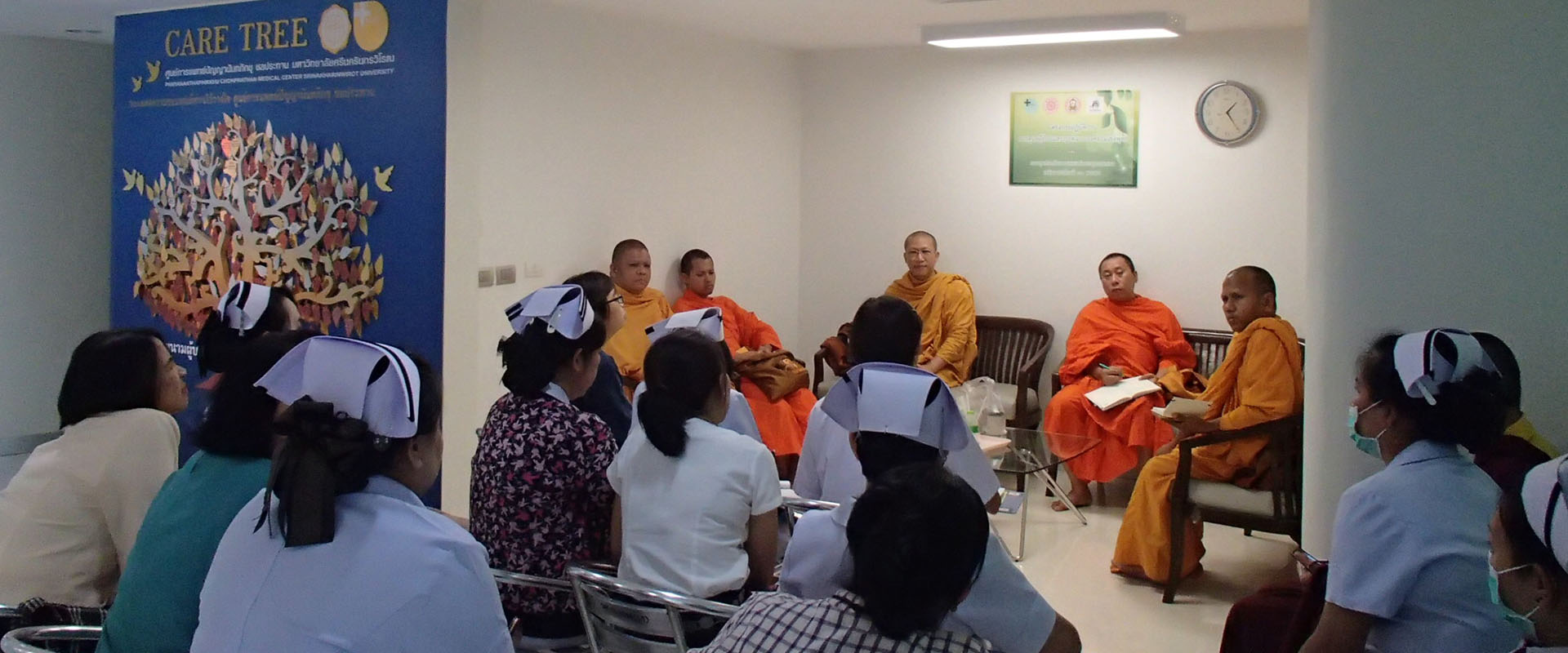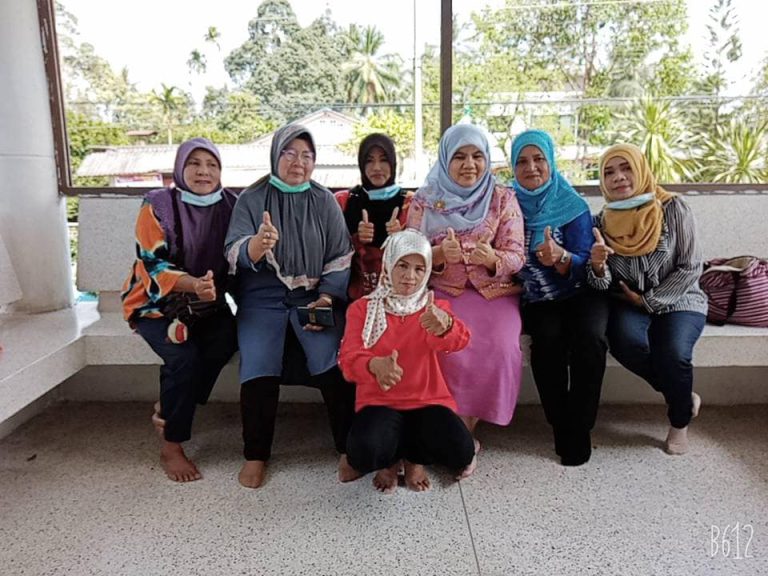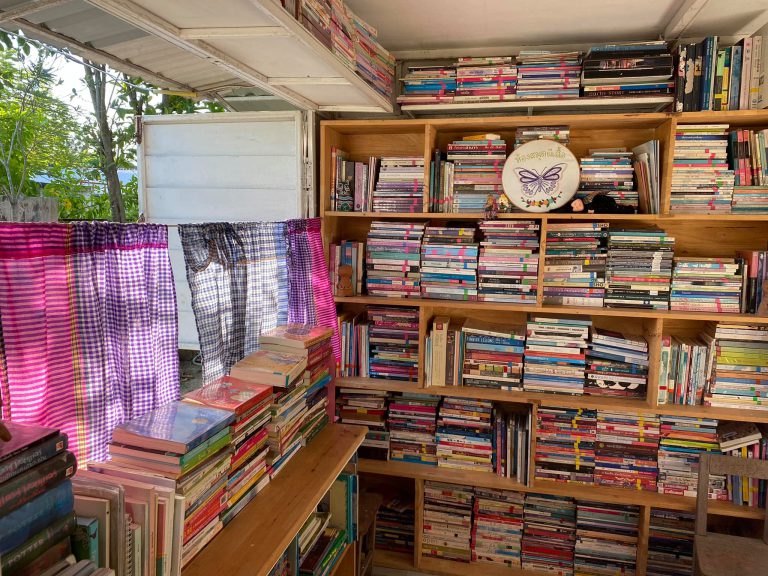Story: Arbthip Suwaluk
Hospitals are among one of the places where suffering can be easily encountered, though the reason why hospitals exist is for the treatment of suffering. To struggle deterioration and decline until it becomes suffering is something that can not be avoided in those kinds of places, whether that is the suffering of patients, relatives or even the staff taking care of them.
Late-stage patients fighting against life-threatening disease provide a clear view of suffering. The more suffering you see, the more difficult it is to escape it. The alleviation of suffering, in addition to taking into account the state of the body and the mind, also gives importance to social and spiritual well-being, because the dynamics of the patient’s family, as well as the patient’s personal beliefs, inform whether they decide to receive treatment. Spiritual and social well-being can also be transformative factors that conduct the patient’s last moments in a certain direction. The patient may pass away naturally, or unnecessarily tethered to life.
Holistically Alleviating Suffering By Working Together
The Panyananthaphikkhu Chonprathan Medical Center at Srinakharinwirot University, formerly known as Chonprathan Hospital, has provided buddhist-influneced, holistic care for patients and their families with support from a buddhist organisation: the Giladhamma volunteer group, which is a community of monks that have gathered to help people whose spirits suffer. The volunteer group was founded by a group of novice monk volunteers, studying in the Graduate Program in Life and Death Studies at Chulalongkorn University. They provide spiritual counselling as part of their practice; they marry buddhist teachings with psychological counselling to help lighten the suffering that patients and their families carry within themselves and to help them accept and face the reality of their suffering. The monks also look after the medical staff who treat these patients as well.

The Phra Khun Jao clinic, a project in which the Giladhamma volunteers visit and counsel patients and their families, was started in 2017. The nursing staff evaluate what kind of help each patient needs and records this information into a form that is directly sent to the volunteers and a card that indicates the level of the patient’s spiritual suffering before and after spiritual counselling. Then, the system was expanded from terminally-ill patients to accommodate other categories of patients that need spiritual care as well such as patients whose conditions unexpectedly worsen and patients who are uncooperative in treatment.

The monks simultaneously looked after and nurtured the staff’s spiritual wellbeing. They organised a retreat at Wat Cholpathan Rangsarit, created the Support For Healthcare Workers Foundation and another that hosts evening prayers, as well as writing up lessons based on the clinic’s operations. Not only do the staff benefit by getting to destress from their work, but they also are given the opportunity to develop their listening and communication skills.
Learning to work together helps the organisation function smoothly and continuously: from administrators who recognize the importance of the work, spaces that are organised for accessibility, transportation arranged to and from the temple for the volunteer monks, to crucially, creating a system that works with when the staff can allocate off-duty time. For example, the Support For Healthcare Workers Foundation arranges for each unit of nurses to work a shift as participants in different activities. Working together on any level, is therefore extremely important.
An Interdisciplinary Team of ‘Phra Asa’ and Nurses
One Friday afternoon, team members slowly trickle into the designated area of the building that had been prepared for them. The staff paid their respects to the Phra Asa (volunteer monks), or Phra Ajarn, as they are more commonly referred to, and they all chatted among themselves. Once all the team members had arrived, the Phra Khun Jao clinic began the session by assigning, or offering, patient cases — a summary of the patient’s care compiled by the nurses that begins with the nature and severity of their physical symptoms, and details the reasons for giving them spiritual counselling, what their needs are and how they are spiritually suffering — to the monks.


In addition to profiling the patient, it is also important to provide an account of the patient’s family, especially when the patient is unconscious. The family is then the priority of emotional support, as in the case of a three year old ICU patient in critical condition whose blood pressure was dropping, and was attached to a breathing tube. The parents had accepted their child’s condition, and decided not to prolong their child’s life through means that would aggravate their suffering. However, the knowledge that they could say goodbye to their child at anytime meant that the mother, who had been a pillar of strength while caring for the child since birth, could not quite bring herself to accept it, and the father, who had not been as involved in caring for his child as he should have been, found himself full of doubt.
Once the monks have the information on patients and their families, they disperse to begin their visits in the patient ward, led by a nurse and equipped with a set of offerings. In addition to talking and listening, whether to patients or their families, to alleviate and heal suffering, the monks organize alms-giving, which can hold a lot of spiritual value, by using ritual to connect to faith and shoring up their ability to accept their reality. Returning to the example of the child ICU patient, the parents were able to make merit for their child through alms-giving, which was something that they were able to do for their child when they needed to prepare themselves to say goodbye.

The day concludes with a team reflection section. After wrapping up the visits, the volunteer monks and staff reconvene to share what they experienced, reflecting on the atmosphere of the visits and the behaviors of patients and families. In some cases, if the patient isn’t quite ready to meet with the monk, they won’t be forced to do so, and in others, the family has already chosen life-prolonging treatment with hope of success though the procedure is risky. Nonetheless, talking to a monk can still somewhat alleviate their suffering and feelings of guilt. Ultimately, the exchanging of stories and experiences helps the nurses better understand the patients they are taking care of and the perspectives and feelings of patients’ families. On top of that, the nurses also receive insights and life lessons for their consideration.
Looking After Healthcare Workers’ Spiritual Well-being, Reflecting on Progress
Recognizing that healthcare workers have to contend with the suffering of patients and their families, the Dhamma Healing Clinic (Foundation for Healthcare Workers’ Spiritual Well-being) and Evening Prayer Foundation organise a discussion led by volunteer monks every Friday afternoon for healthcare workers on the team to share and listen to each others’ own struggles.
At first, the proposal to schedule volunteering shifts for each unit of nurses to include the discussion session met with some resistance, because, after all, it added to their working hours. However, the results of the sessions were positive, because despite the initial reluctance, the participants listened to one another during the session, and were able to begin healing themselves when they left because of the tangible benefits of the session. Healthcare staff that receive care and are thus fully prepared to work will continue to positively impact their patients, colleagues and the organisation.


In the end, understanding and learning from one’s own suffering will more powerfully illuminate the suffering of others, and through that understanding of suffering, every single human being will become companions in hardship, regardless of the nature of their relationship with one another.
The author would like to thank these individuals and organisations for providing assistance and information:
The Giladhamma Volunteer Group and Wimonrat Kaowinai, head nurse of the Critical Care Ward, Panyananthaphikkhu Chonprathan Medical Center, Srinakharinwirot University



